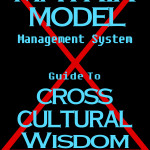Dr. Fiona Citkin urges minorities and immigrants to work together to bring meaningful, positive change in the U.S. in her Huffington Post article, “Immigrants and Minorities of America, Unite!” Yes, there are many benefits to bringing minorities and immigrants together, but there are also numerous pushes & pulls involved in uniting them, in establishing their local-global connection. I have long maintained that “Harmonize NOT Homogenize” is key to our working together, but today’s highly emotional environment makes even this approach difficult.
Continue reading Can Immigrants and Minorities Work Together? – by Deborah Levine

